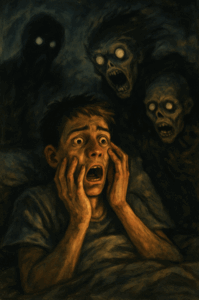Troubled by Scary Dreams? Here’s How You Can Sleep Peacefully Again
🌙 When Sleep Turns Scary: Why Nightmares Happen
We all know what it’s like to wake up from a bad dream, heart pounding and covered in sweat. But for some people, these scary dreams or nightmares happen too often — disturbing sleep, increasing fear of going to bed, and causing anxiety throughout the day.
If you or someone you love is struggling with disturbing dreams or sleepless nights, you’re not alone — and help is available.
😴 Case Example: A Common Story
Meet Mr. R, a 38-year-old IT professional from Chennai. It started with frequent nightmares about falling, being chased, or losing loved ones. At first, he brushed them off. But over time, the dreams became more frequent and terrifying. He started avoiding sleep and grew anxious during the day.
Eventually, Mr. R consulted a doctor and was prescribed antidepressants and sleeping pills (benzodiazepines). Initially, they worked. But years later, he found himself stuck — unable to sleep without the tablets, and still haunted by dreams. Worse, every time he tried to stop the pills, his sleep and anxiety worsened.
This is not uncommon. But it can be treated.
🧠 Why Do Nightmares Happen in the First Place?
Scary dreams are often a window into unresolved emotions or an overactive nervous system. They can happen because of:
-
Stress, anxiety, or depression
-
Post-traumatic memories
-
Sleep disorders
-
Side effects or withdrawal from medications
-
Poor sleep hygiene and irregular sleep patterns
Certain medications — especially antidepressants and sleeping pills (like alprazolam) — can suppress dream sleep (REM sleep). When they’re stopped, the brain “rebounds” with intensified, vivid dreams, which can be frightening.
⚠️ What Happens When You Stop Medications Abruptly
Many people, like Mr. R, are on antidepressants and benzodiazepines for years. When they try to stop them suddenly or without a proper taper, the brain reacts:
-
Nightmares become intense
-
Sleep becomes broken
-
Anxiety returns, often worse than before
-
Physical symptoms like shakiness, palpitations, or “brain zaps” may appear
This is not a relapse. It’s a withdrawal effect. And it needs compassionate, step-by-step care.
✅ The 5-Step Cure: Healing from the Roots
🔁 1. Switch Medications the Right Way
The first step is not to stop everything suddenly. Instead:
-
Switch to fluoxetine, a long-acting antidepressant that is easier to taper
-
Replace short-acting pills like alprazolam with longer-acting ones like lorazepam, which are safer for tapering
This provides stability and prevents severe withdrawal.
🧘 2. Add Structure to Your Day
You may not control your dreams, but you can control your daily rhythm.
-
Wake up and sleep at the same time daily
-
Get 30–45 minutes of sunlight and exercise
-
Avoid caffeine and screens after 7 PM
-
Create a wind-down routine (music, warm bath, light reading)
This resets the body clock and improves deep, peaceful sleep.
💊 3. Slow and Safe Tapering
Once stable, the psychiatrist will guide a slow tapering plan:
-
Benzodiazepines are tapered first, gradually over 2–6 months
-
Fluoxetine is tapered only after sleep and mood have become stable
-
Supplements like melatonin, magnesium, or omega-3 may be added
This ensures your brain gets time to heal naturally.
🧠 4. Therapy for the Mind and Sleep
Certain techniques can help reduce nightmares and anxiety:
-
CBT-I (Cognitive Behavioral Therapy for Insomnia) – helps correct sleep habits and thoughts
-
Nightmare Rehearsal Therapy – helps rewrite the dream script mentally during the day
-
Journaling and relaxation breathing – reduce unconscious emotional buildup
When you process feelings during the day, your dreams become peaceful at night.
🌱 5. Restoring Confidence and Control
With support and the right tools, people often report:
-
Fewer and milder dreams
-
Longer, deeper sleep
-
Reduced anxiety during the day
-
A sense of independence from medications
The final goal is not just symptom control — it’s freedom and emotional healing.
📌 Key Takeaways: How to Overcome Scary Dreams and Sleep Issues
| Problem | Solution |
|---|---|
| Frequent nightmares | Sleep therapy, exercise, journaling |
| Long-term pill use | Structured taper under doctor’s care |
| Withdrawal symptoms | Medication switch, slow dose reduction |
| Sleep disturbance | Melatonin, CBT-I, consistent routine |
| Anxiety and fear | Relaxation practices, family support |
🩺 Your Brain Can Heal – Let It
Just like Mr. R, many people silently suffer for years. But nightmares and medication dependence are not life sentences. With a patient, scientific, and kind approach, healing is not only possible—it’s predictable.
If you’re struggling with bad dreams, poor sleep, or trouble stopping medications, reach out for help. You deserve to sleep peacefully again.
📍 Dr. T. Srinivas Rajkumar
Consultant Psychiatrist
🕓 Available daily at Apollo Clinics, Velachery & Tambaram
📞 8595155808 | 🌐 www.srinivasaiims.com